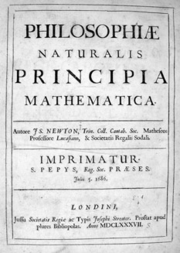
1687 in science
Encyclopedia
The year 1687 in science
and technology
involved some significant events.

Science
Science is a systematic enterprise that builds and organizes knowledge in the form of testable explanations and predictions about the universe...
and technology
Technology
Technology is the making, usage, and knowledge of tools, machines, techniques, crafts, systems or methods of organization in order to solve a problem or perform a specific function. It can also refer to the collection of such tools, machinery, and procedures. The word technology comes ;...
involved some significant events.
Astronomy

- The constellation Triangulum Minus is named by Johannes HeveliusJohannes HeveliusJohannes Hevelius Some sources refer to Hevelius as Polish:Some sources refer to Hevelius as German:*Encyplopedia Britannica * of the Royal Society was a councilor and mayor of Danzig , Pomeranian Voivodeship, in the Polish-Lithuanian Commonwealth...
.
Physics
- July 5 - Isaac NewtonIsaac NewtonSir Isaac Newton PRS was an English physicist, mathematician, astronomer, natural philosopher, alchemist, and theologian, who has been "considered by many to be the greatest and most influential scientist who ever lived."...
's PrincipiaPrincipiaPrincipia could refer to:*Philosophiae Naturalis Principia Mathematica, Isaac Newton's three-volume work containing explanations of his laws of motion and his law of universal gravitation*Principia , a stem-group coralline alga...
(full title Philosophiae Naturalis Principia MathematicaPhilosophiae Naturalis Principia MathematicaPhilosophiæ Naturalis Principia Mathematica, Latin for "Mathematical Principles of Natural Philosophy", often referred to as simply the Principia, is a work in three books by Sir Isaac Newton, first published 5 July 1687. Newton also published two further editions, in 1713 and 1726...
) is published, in which Newton describes his theory of universal gravitation, explains the laws of mechanicsMechanicsMechanics is the branch of physics concerned with the behavior of physical bodies when subjected to forces or displacements, and the subsequent effects of the bodies on their environment....
, gives a formula for the speed of soundSpeed of soundThe speed of sound is the distance travelled during a unit of time by a sound wave propagating through an elastic medium. In dry air at , the speed of sound is . This is , or about one kilometer in three seconds or approximately one mile in five seconds....
and demonstrates that Earth is an oblate spheroid. The concepts in the Principia become the foundations of modern physicsPhysicsPhysics is a natural science that involves the study of matter and its motion through spacetime, along with related concepts such as energy and force. More broadly, it is the general analysis of nature, conducted in order to understand how the universe behaves.Physics is one of the oldest academic...
.
Births
- October 14 - Robert SimsonRobert SimsonRobert Simson was a Scottish mathematician and professor of mathematics at the University of Glasgow. The pedal line of a triangle is sometimes called the "Simson line" after him.-Life:...
, ScottishScottish peopleThe Scottish people , or Scots, are a nation and ethnic group native to Scotland. Historically they emerged from an amalgamation of the Picts and Gaels, incorporating neighbouring Britons to the south as well as invading Germanic peoples such as the Anglo-Saxons and the Norse.In modern use,...
mathematicianMathematicianA mathematician is a person whose primary area of study is the field of mathematics. Mathematicians are concerned with quantity, structure, space, and change....
(died 17681768 in scienceThe year 1768 in science and technology involved some significant events.-Biology:* Caspar Friedrich Wolff begins publication of "De Formatione Intestinarum" in the Mémoires of The Imperial Academy of Arts and Sciences The year 1768 in science and technology involved some significant...
). - April 2 - Johann Jacob DilleniusJohann Jacob DilleniusJohann Jacob Dillen Dillenius was a German botanist.Dillen was born at Darmstadt and was educated at the University of Giessen, where he wrote several botanical papers for the Ephemerides naturae curiosorum, and printed, in 1719, his Catalogus plantarum sponte circa Gissam nascentium, illustrated...
, German botanist (died 17471747 in scienceThe year 1747 in science and technology involved some significant events.-Anatomy:* Bernhard Siegfried Albinus , with the help of the artist Jan Wandelaar , produces the most exact account of the bones and muscles of the human body in Tabulae Sceleti et Musculorum Corporis Humani.* Albrecht von...
).
Deaths
- January 28 - Johannes HeveliusJohannes HeveliusJohannes Hevelius Some sources refer to Hevelius as Polish:Some sources refer to Hevelius as German:*Encyplopedia Britannica * of the Royal Society was a councilor and mayor of Danzig , Pomeranian Voivodeship, in the Polish-Lithuanian Commonwealth...
, German astronomerAstronomerAn astronomer is a scientist who studies celestial bodies such as planets, stars and galaxies.Historically, astronomy was more concerned with the classification and description of phenomena in the sky, while astrophysics attempted to explain these phenomena and the differences between them using...
(born 16111611 in scienceThe year 1611 in science and technology involved some significant events.-Astronomy:* February 27 - Sunspots are first observed by telescope by Frisian astronomers Johannes Fabricius and David Fabricius and Johannes publishes the results of these observations in De Maculis in Sole observatis in...
).

